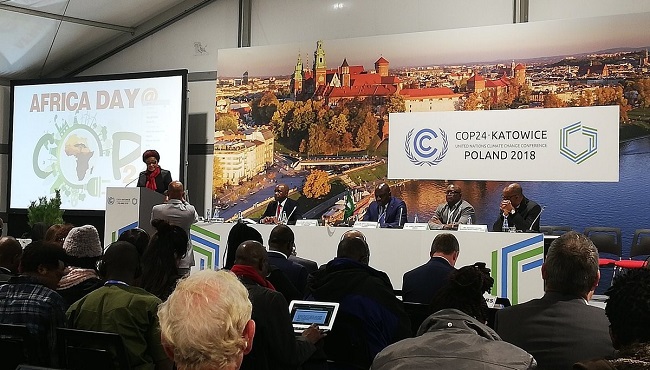Climate change focused continental coalition of civil society organisations, the Pan African Climate Justice Alliance (PACJA), said on Tuesday, December 4, 2018 in Katowice, Poland, that African countries should remain focused at the global summit as any position that contradicts the real climate change implications to Africa would shift the burden of climate change to them

We join the African Governments and experts in underscoring the vital importance of ambitious outcomes from this COP. A comprehensive and balanced Paris Agreement Work Programme should be delivered here in COP24 and uphold equity, justice and act as an anchor in the Paris Agreement’s implementation. Also, pre-2020 ambition remains vital to stay within the closing window as indicated by the recently released IPCC 1.5c report and the Paris Agreement implementation.
We reiterate that means of implementation remain critical and should be tied to both pre-2020 and Paris Agreement regime.
We therefore expect:
Climate Finance
We expect climate finance to continue to be a critical issue of negotiations for this COP as it has been in previous ones. We expect a clear roadmap for fulfilment of climate finance commitment of $100 billion per year by 2020 should be agreed, the commitment should include towards an ambitious Green Climate Fund (GCF) replenishment. Parties should also agree to discuss a new post-2025 quantified climate finance goal from the floor of $100 billion. Also, Parties should agree on accounting rules for climate finance which are robust and provide full transparency on actual assistance provided and to be provided to the developing countries.
Another climate finance area is on the discussion of how Adaptation Fund will serve the Paris Agreement. Parties should agree on maintaining the current balance of the Fund’s board membership, operational policies and guidelines for developing countries to access the funds when it serves the Paris Agreement.
Nationally Determined Contributions (NDCs)
Parties will also negotiate on the Nationally Determined Contributions timeframe and features with link to the Paris Agreement. A single five-year common timeframe for NDC implementation should be agreed at COP24 in order to enhance consistency and comparability of NDCs. Also, this should be linked with the Global Stocktake for periodic review on the implementation of action and support.
The 2018 facilitative dialogue – Talanoa dialogue: We would like to thank the Fijian COP23 Presidency for taking ownership of the 2018 Facilitative Dialogue (now known as the Talanoa Dialogue 2018) and for attempting to raise its political relevance. Leadership from developing countries benefits the process and goes some way towards distributing influence in the negotiations in a more representative manner. We therefore recommend that the Talanoa Dialogue must assess the actions of countries against both their historical responsibility and the remaining carbon budget available for 1.5°C. The Talanoa Dialogue must also assess the provision of support from donor countries and bear this assessment in mind when assessing the actions of developing countries. Finally, the Talanoa Dialogue must privilege the perspectives of affected communities while safeguarding against potential conflicts of interest.
Loss and Damage: Africa continues to suffer enormous economic losses in billions of dollars as a result of climate change impacts. Coupled with un-costed social losses due to climate induced displacement of persons thus triggering conflicts. It is worrying to keep hearing the answer for loss and damage as insurance, this might be possible in developed countries but NOT in developing countries especially in Africa, this is a far-fetched dream. We call for the commitment in the implementation of the Warsaw International Mechanism on Loss and Damage and need a predictable a financing approach for Loss and Damage in Africa.
Capacity Building: We emphasise that there is need to build long-term capacity among developing countries which includes strengthening capacity of climate change institutions.; capacity building should at all times be focused on the needs of countries and driven by countries. Further, capacity building should adopt a multi-stakeholder approach, including all stakeholders and supportive legislation to facilitate this. We call for provision of support to the Capacity Building Initiative for Transparency (CBIT), setting aside of additional resources and meeting of existing voluntary contributions pledges. We further call for provision of financial resources to support country driven capacity building initiatives.
Gender: We note the importance of gender considerations in policies that supports activities on adaptation, mitigation, finance, technology development and transfer, including capacity building, and we acknowledge the progress made in implementing decisions on gender under the Convention. We call for Parties to increase their efforts in ensuring that women are represented in all aspects of the Convention process, and gender mainstreaming is achieved in all processes, and activities of the Convention.
We are calling on parties here in Katowice, Poland to fresh energy and push the negotiations towards concrete outcomes that will address this grave concern to Africa. The world is watching and the outcome from this COP24 as it will determine whether the Paris Agreement will be a reality or a mere rhetoric.
We strongly urge our African governments to rethink critically on the progress of climate talks as any position that contradicts that real climate change implications to Africa then will shift the burden of climate change to African countries.
